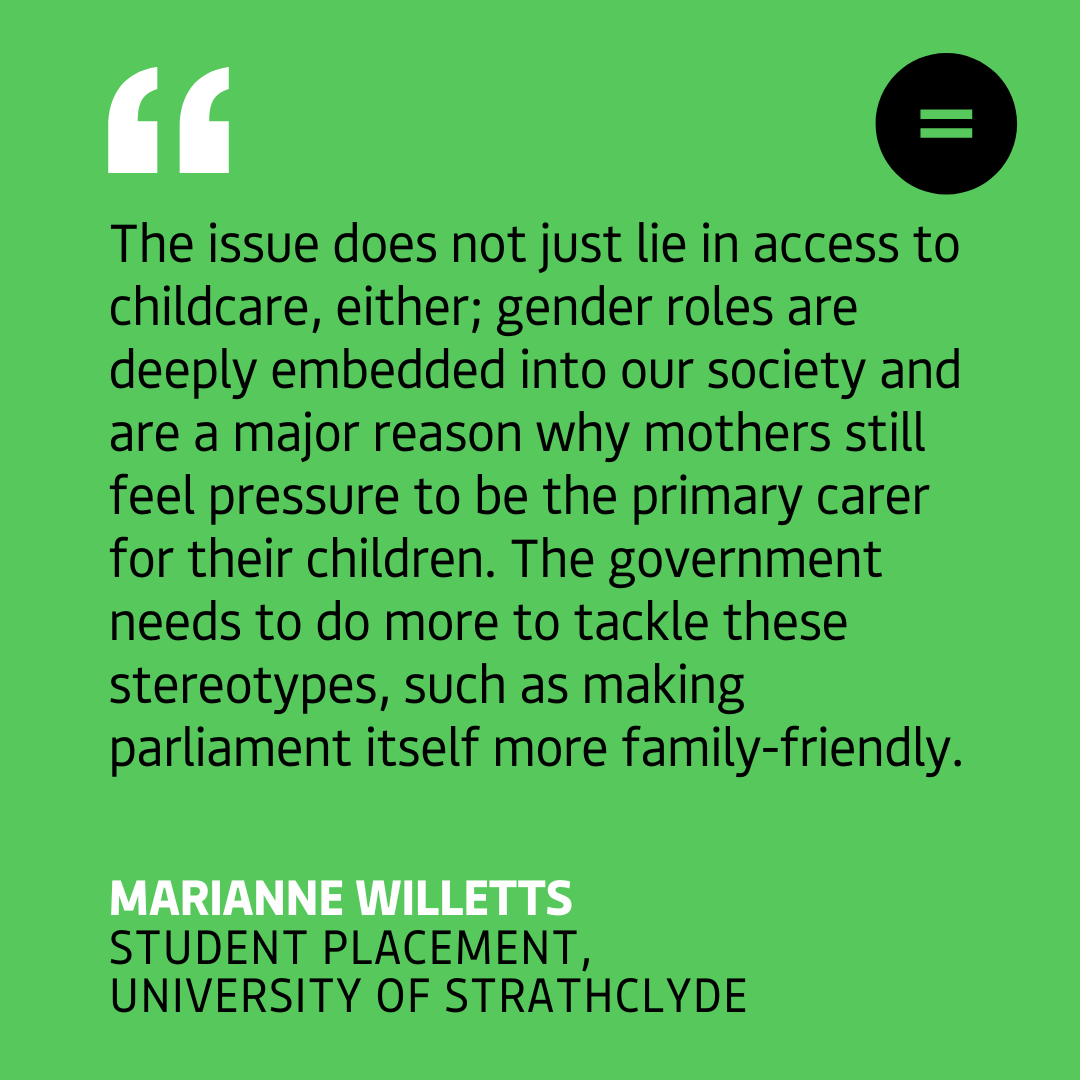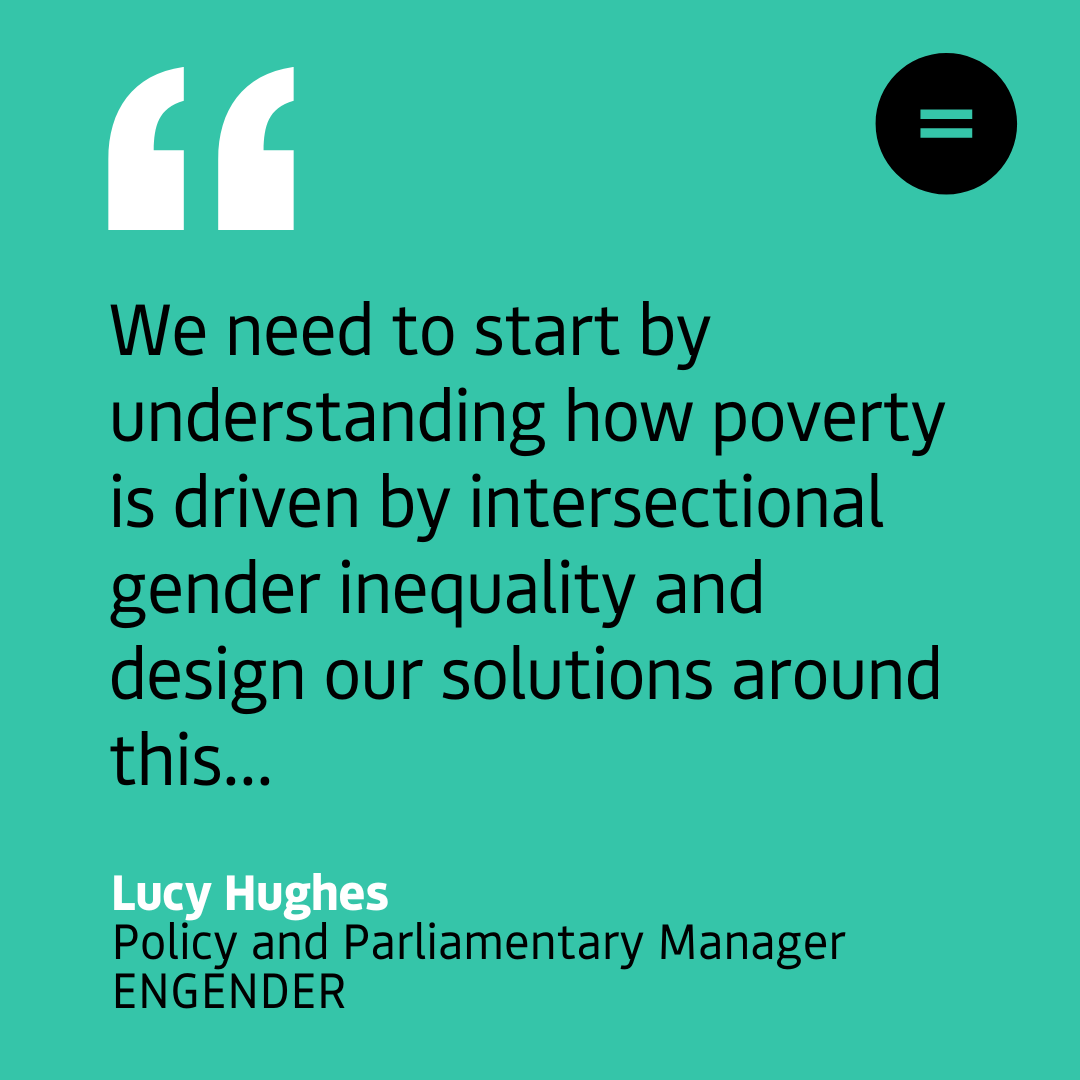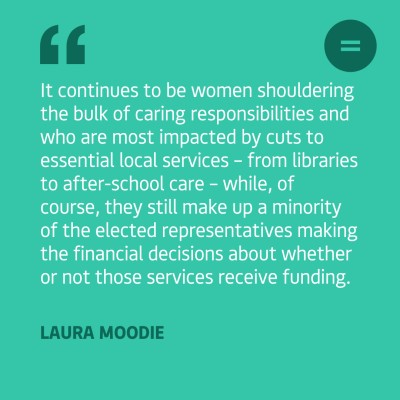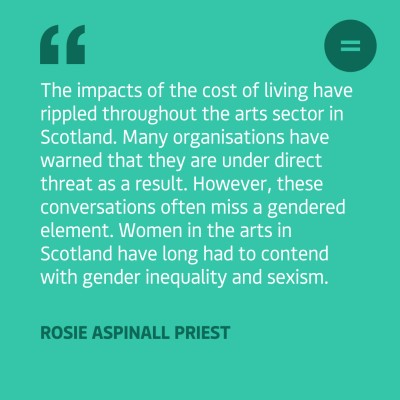Engender blog
GUEST POST: The Cost of Childcare Crisis
Engender has recently hosted student placements from the MSc in Social Research at the University of Edinburgh and the University of Strathclyde Applied Gender Studies and Research Methods course. As part of their research outputs, the students have produced a series of blogs.
In this post, Marianne looks at how the cost of living crisis continues to disproportionately impact women, and how this is compounded by women's unpaid work and childcare responsibilities.

Milk, bread, electricity, petrol and even crème eggs: the cost of living crisis has seen drastic surges in prices of just about every household good. Everyone’s purses are feeling the strain, and heads are turning to the government to aid the struggling population.
Often unacknowledged in these debates, however, is the evidence that women are being disproportionately affected by the cost of living crisis over men. The economic instability of the country is affecting the lowest-paid of the population, of which women make up the majority, with 69% of low-paid and insecure jobs being held by women. Engender released their Women & The Cost of Living report in November 2022 that highlighted that this disproportion is related to the long-standing inequalities that ensure women make up the highest percentage of low-paid jobs, such as those in the care sector and unpaid care and domestic jobs at home. Based on this perhaps unsurprising revelation, Engender made a series of suggestions for the Scottish Parliament in order to tackle these inequalities.
Cost of Living: Fight Against Poverty is a Fight for Gender Equality
Lucy Hughes, Engender's Policy and Parliamentary Manager, recently published an article about the ongoing crisis of women’s poverty, as part of the Poverty Alliance’s Scottish Anti-Poverty Review. The article argues that intersectional gender analysis is essential when developing policy that tackles poverty in Scotland. In this blog Lucy has pulled out some of the key headlines from the article, which is available to read in full here.

The first half of 2023 has seen changes in political leadership for Scotland, with Humza Yousaf taking over as First Minister. This has led to the Scottish Government creating three new ‘critical missions', including: ‘Equality - tackling poverty and protecting people from harm.’ As a result, anti-poverty work is high on the political agenda, which presents a vital opportunity to share work that has been done to show the gendered nature of poverty in Scotland.
Engender has already been working alongside many others in the women’s sector and beyond, to show how the Cost of Living crisis is a crisis for women’s equality because our economy is structured in a way which systemically financially disadvantages women. We have advocated at an international level to highlight how women’s human rights under ICESCR are being failed in Scotland. Ultimately, we know that women’s poverty is a result of long-standing, deep-rooted, and systemic fault lines in our society.
As anti-poverty campaigners, if we are to build solutions that will eradicate poverty in Scotland, we need to start by understanding how poverty is driven by intersectional gender inequality and design our solutions around this. The lives of women, especially if faced with intersecting marginalisation, are continually shaped by having less access to well-paid secure work, a vastly higher likelihood of reliance on shrinking social security, and lesser access to resources within the household.
Women’s incomes are lower than men’s, which means women are more likely to experience financial precarity, high levels of debt and arrears, a lack of long-term savings and access to adequate pensions. Black and minority ethnic women and disabled women are more likely to be in in-work poverty than white women and non-disabled women. Women are the majority of primary caregivers for children and are more likely to be unpaid carers for disabled and older people. The widespread nature of men’s violence against women has a significant impact on access to resources, incomes, and financial security – and often includes financial abuse. These factors see women, particularly minoritised women, as the household managers and shock absorbers of poverty, fully exposed to the sharp end of economic or other crises.
To tackle the gendered nature of poverty, we must first recognise these gendered issues around care, gender-based violence, and the linked existing structural inequality that exists across the labour market.
Deep-rooted occupational segregation, alongside systemic issues with returning to work after providing unpaid care for children, substantially diminishes women’s lifetime earnings and results in women being clustered into undervalued roles. This is largely due to harmful assumptions and stereotypes about women’s and men’s capabilities, gender roles and what constitutes ‘work.’
Women are also twice as likely as men to rely on social security, and therefore on a system that fuels poverty. Analysis from the House of Commons Library in 2016 found that up to 86% of net ‘savings’ carved from social security payments and public services between 2010 and 2020 will have come from women’s incomes. This leaves disabled, Black and minority ethnic women, refugee and migrant women, lone parents, care experienced women, unpaid carers and women experiencing domestic abuse at even greater risk of poverty and destitution.
Despite the wealth of qualitative research on women’s experiences, this is rarely reflected in official data that is used to shape and determine policy decisions. Scotland is still not capturing enough high quality, intersectional data about women’s experiences of poverty.
.png)
For example, the use of household measures of poverty in Scotland assumes that household income is equally distributed and accessible to women and men. There are significant evidence gaps about the experiences of women from different marginalised communities, which actively obscures the specific discrimination and pressures many women are subject to, and as such, the true extent of women’s poverty and, therefore, child poverty.
Anti-poverty work which looks at reforming social security at devolved and UK levels must understand the gendered nature of the reliance of women on the welfare safety net and the discrimination that is built into its delivery. As we see innovation in Scotland of new economic solutions to tackle poverty, such as the development of the Minimum Income Guarantee, we must work together to ensure such anti-poverty policies do not further entrench women’s inequality but actively seek to address it as a core goal.
In practice, this means lobbying for intersectional gender analysis to shape policies that explicitly address the inequality baked into the fabric of our social security systems and the structure of our economy. It starts by making visible how poverty and economic inequality are experienced at higher rates by women and marginalised groups across our society, in large part due to the way our economy and welfare systems are designed and shaped by decision-makers.
Cost of Living Crisis: The hidden cost of politics

As part of our blog series on the cost of living crisis, activist and campaigner Laura Moodie explores the hidden costs of participating in politics during the cost of living crisis, and the challenges this creates for achieving equal representation for women at all levels of politics.
For International Women’s Day this year, I had the joy of meeting with a group of fantastic Green women in the amazing Ayrshire Women’s Hub. Despite the dark and chilly night - with snow hinted at by the weather forecast - by the time the meeting started in earnest, we’d had to bring in extra chairs to fit everyone in.
Cost of Living Crisis: How are rising costs affecting women in the arts?

As part of our blog series on the cost of living crisis, artist, writer and researcher Rosie Aspinall Priest explores the impact of the cost of living crisis on women in the arts in Scotland, and the need for more reliable, well-paid and flexible opportunities for those working in the arts.
Of the world’s ‘advanced economies’, the UK is amongst the most impacted by the cost of living crisis. The crisis has negatively impacted women disproportionately compared to their male counterparts. From rising rent prices to stagnating wages and increasing unemployment, more and more women are struggling to make ends meet. This burden is far from evenly distributed. Research from the Women’s Budget Group found that women were more likely to be living in overcrowded, poorly insulated, and poorly maintained homes than men. People from the global majority are almost twice as likely to be facing redundancy than white workers. It’s no wonder that 31 per cent of women highlighted the cost of living as a major source of financial stress, according to research from the Reward and Employee Benefits Association.
Cost of Living Crisis: Gaps in support for women on low incomes in Scotland

As part of our blog series on the cost of living crisis, Laura Robertson from The Poverty Alliance talks about their recent report with the Scottish Women's Budget Group on the detrimental impacts on the lives of women living on low-incomes in Scotland caused by the crisis.
“I spoke to my friend who told me she has been starving and only eats at night. I have started doing that though it didn’t go well with me the first day, but I will get used to it.” (Idia, aged 35-44, lone mother and asylum seeker)
The cost of living crisis is having devastating impacts on people living on low incomes in Scotland. Research with 38 women affected by the cost of living crisis in Scotland published in November by the Poverty Alliance and the Scottish Women’s Budget Group reveals the devastating impacts on women living in a range of circumstances across Scotland. Our research found that women are facing deepening levels of poverty and hardship as they struggle to afford essentials. This blog examines gaps in support for women living on low incomes, reflecting on both the Autumn Statement and the Scottish Budget.
Downloads
 Engender Briefing: Pension Credit Entitlement Changes
From 15 May 2019, new changes will be introduced which will require couples where one partner has reached state pension age and one has not (‘mixed age couples’) to claim universal credit (UC) instead of Pension Credit.
Engender Briefing: Pension Credit Entitlement Changes
From 15 May 2019, new changes will be introduced which will require couples where one partner has reached state pension age and one has not (‘mixed age couples’) to claim universal credit (UC) instead of Pension Credit.
 Engender Parliamentary Briefing: Condemnation of Misogyny, Racism, Harassment and Sexism
Engender welcomes this Scottish Parliament Debate on Condemnation of Misogyny, Racism, Harassment and Sexism and the opportunity to raise awareness of the ways in which women in Scotland’s inequality contributes to gender-based violence.
Engender Parliamentary Briefing: Condemnation of Misogyny, Racism, Harassment and Sexism
Engender welcomes this Scottish Parliament Debate on Condemnation of Misogyny, Racism, Harassment and Sexism and the opportunity to raise awareness of the ways in which women in Scotland’s inequality contributes to gender-based violence.
 Gender Matters in Social Security: Individual Payments of Universal Credit
A paper calling on the Scottish Government to automatically split payments of Universal Credit between couples, once this power is devolved to the Scottish Parliament.
Gender Matters in Social Security: Individual Payments of Universal Credit
A paper calling on the Scottish Government to automatically split payments of Universal Credit between couples, once this power is devolved to the Scottish Parliament.
 Gender Matters Manifesto: Twenty for 2016
This manifesto sets out measures that, with political will, can be taken over the next parliamentary term in pursuit of these goals.
Gender Matters Manifesto: Twenty for 2016
This manifesto sets out measures that, with political will, can be taken over the next parliamentary term in pursuit of these goals.
 Scottish NGO Briefing for UN Special Rapporteur on Violence Against Women
Joint briefing paper for the UN Rapporteur on Violence Against Women.
Scottish NGO Briefing for UN Special Rapporteur on Violence Against Women
Joint briefing paper for the UN Rapporteur on Violence Against Women.

Newsletter
Sign up to receive our newsletter here:
Sign up to our mailing list
Receive key feminist updates direct to your inbox: